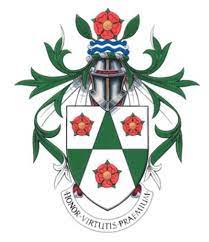
Lancashire is a ceremonial county in North West England. It is bordered by Cumbria to the north, North Yorkshire and West Yorkshire to the east, Greater Manchester and Merseyside to the south, and the Irish Sea to the west. The largest settlement is Blackpool.

Lytham St Annes is a seaside town in the Borough of Fylde in Lancashire, England. It is on the Fylde coast, directly south of Blackpool on the Ribble Estuary. The population of the built-up area at the 2021 census was 42,695. The town is made up of the four areas of Lytham, Ansdell, Fairhaven and St Annes-on-the-Sea.
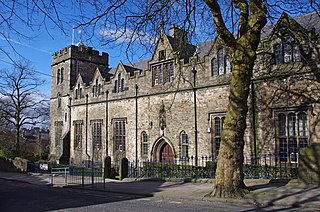
Lancaster Royal Grammar School (LRGS) is an 11–18 boys grammar school in Lancaster, Lancashire, England. Old students belong to The Old Lancastrians. The school's sixth form opened to girls in 2019. LRGS is also in the United Kingdom's thirty oldest schools.

King Edward VII and Queen Mary School (KEQMS) was an HMC independent co-educational school in Lytham St Annes, Lancashire, England, formed in 2000 by the merger of King Edward VII School and Queen Mary School. It merged with Arnold School, Blackpool, in 2012 to form AKS Lytham.
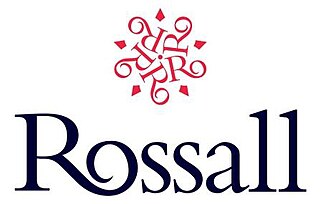
Rossall School is a public school for 0–18 year olds, between Cleveleys and Fleetwood, Lancashire. Rossall was founded in 1844 by St Vincent Beechey as a sister school to Marlborough College which had been founded the previous year. Its establishment was "to provide, at a moderate cost, for the sons of Clergymen and others, a classical, mathematical and general education of the highest class, and to do all things necessary, incidental, or conducive to the attainment of the above objects." Along with Cheltenham, Lancing and Marlborough, Rossall was part of a flurry of expansion in public school education during the early Victorian period.
Fylde Rugby Union Club is a rugby union club based in Lytham St Annes, on the Fylde coast in Lancashire, England. The home venue is the Woodlands Memorial Ground on Blackpool Road in Ansdell and the first team play in English rugby's National League 2 North, the fourth tier of the English rugby union system, following their relegation from National League 1 at the end of the 2017–18 season. There are another two senior teams, the Hawks and the Vandals who play in the English North West Leagues; respectively in the NW Premiership and NW3 North. There is also a Colts team. In previous seasons the Colts have played in the Lancashire & Cheshire regional leagues.

Hutton Grammar School is an 11–18 boys voluntary aided, state-funded Church of England comprehensive day school. It is located 3 miles (4.8 km) south west of Preston, Lancashire, in Hutton, England. It provides education for boys from the age of 11 to 16, and in the Sixth Form for both boys and girls.

LSA High School is a community school maintained by Lancashire County Education Authority. It is an 11–16 Comprehensive.
Sir Martin Wyatt Holdgate is an English biologist and environmental scientist.
The United Church Schools Trust (UCST) is a large education charity in the United Kingdom which owns and operates a group of 12 private schools. The charity is operating under the name United Learning as of 2012.

South Shore is an area of Blackpool, Lancashire, England. It forms the southern part of the town for two miles along the Promenade from Rigby Road to Starr Gate. Its inland boundaries run along Rigby Road, Queen Victoria Road, Ansdell Road, Hawes Side Lane, Common Edge Road and Squires Gate Lane.
The FY postcode area, also known as the Blackpool postcode area, is a group of eight postcode districts in Lancashire, North West England. The districts cover the entire borough of Blackpool and the western parts of the boroughs of Wyre and Fylde. The letters in the postcode area name refer to the Fylde coastal plain. Its five post towns are Blackpool, Fleetwood, Lytham St Annes, Poulton-le-Fylde, Thornton-Cleveleys.

Woodlands Memorial Ground is a rugby stadium in Lytham St Annes, Lancashire, England. It is the home of Fylde Rugby Club and was the home of the Blackpool Panthers between 2006 and 2010.
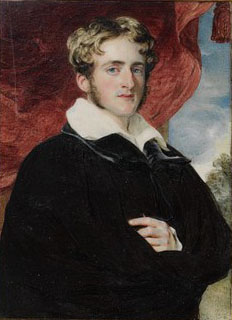
Sir Peter Hesketh-Fleetwood, 1st Baronet, was an English landowner, developer and Member of Parliament who founded the town of Fleetwood, in Lancashire, England. Born Peter Hesketh, he changed his name by Royal assent to Hesketh-Fleetwood, incorporating the name of his ancestors, and was later created Baronet Fleetwood. Predeceased by an older brother, he inherited estates in west Lancashire in 1824. Inspired by the transport developments of the early 19th century, he decided to bring the railway to the Lancashire coast and develop a holiday resort and port. He hired architect Decimus Burton to design his new town, which he named Fleetwood; construction began in 1836. Hesketh-Fleetwood was instrumental in the formation of the Preston and Wyre Railway Company and with his financial support, a railway line was built between Preston and Fleetwood which opened in 1840.
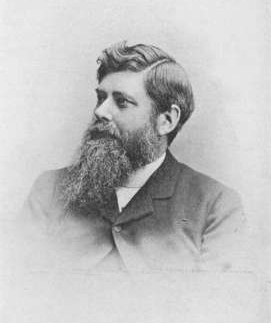
Herbert Armitage James, CH was a Welsh cleric and headmaster of three leading public schools, who ended his "remarkable scholastic career", as it was later described by Austen Chamberlain, by becoming President of St John's College, Oxford. After an Oxford education and early teaching career at Marlborough College, he was headmaster of Rossall School from 1875 to 1886. It was said that he raised the school "to a pitch of all-round excellence which it had not known before". After suffering from health problems at Rossall, he served as Dean of St Asaph from 1886 to 1889. He returned to teaching in 1889, becoming headmaster of Cheltenham College and remaining in this post until 1895, despite being offered the position of headmaster of Clifton College. He then became headmaster of Rugby School and served there to great acclaim. His Rugby School nickname of "The Bodger" is still in use at the school. He left Rugby School in 1909 to become President of St John's College, Oxford, a position he held until his death 22 years later.

Westby-with-Plumptons is a civil parish in Lancashire, England. The parish is in Fylde district and contains the hamlets of Great Plumpton, Little Plumpton, Lower Ballam, Higher Ballam, Moss Side, Peel, and Westby. At the 2011 census, the parish had a population of 1,205. Westby and Plumpton are mentioned in the Domesday Book, as "Westbi" and "Pluntun".
David R. Stephenson was an English rugby union and professional rugby league footballer who played in the 1970s, 1980s, and 1990s. He played club level rugby union for Fylde Rugby Club, and representative level rugby league for Great Britain, and at club level for Salford, Wigan, Leeds and Leigh, as a goal-kicking wing or centre.
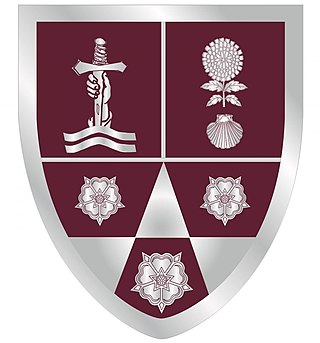
AKS Lytham (AKS), or ArnoldKEQMS, is an independent, co-educational day school located on the Fylde, Lancashire, England. It was formed from the merger of King Edward VII and Queen Mary School (KEQMS) in Lytham St. Annes and Arnold School in Blackpool. It is based on a coastal 35-acre site in Lytham St Annes. AKS Lytham is a member of HMC and a part of the United Church Schools Trust family of schools. AKS is a member of the Round Square group of schools, a network in 50 countries. The school also provides a Beach Schools programme which uses the beaches in Lytham.

King Edward VII School (KES) or King Edward School Lytham was a grammar, direct grant grammar and independent school for boys, founded in 1908 and situated in the coastal town of Lytham St. Annes, Lancashire. The school was merged with Queen Mary School for girls in 1999, and was renamed to create the co-educational King Edward VII and Queen Mary School (KEQMS)

The Lytham Festival is an annual five-day music festival held in Lytham St Annes, Lancashire. The festival takes place adjacent to Lytham Windmill on Lytham Green, a strip of grass between the town's coastal road and the River Ribble estuary. In promotion and ticketing, festival organisers refer to the venue as "The Proms Arena". It is usually held in mid-July, with the final night often featuring an evening of orchestral classical music, in the style of a traditional promenade concert. Lytham Festival first took place in 2009, and is operated by Lancashire-based promoter Cuffe & Taylor, owned by Live Nation UK. The festival typically has a capacity of 20,000.


